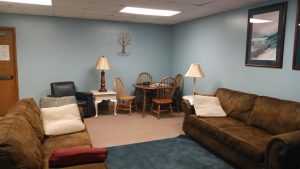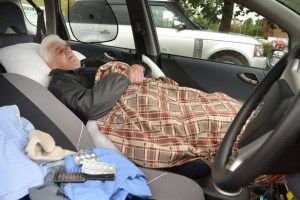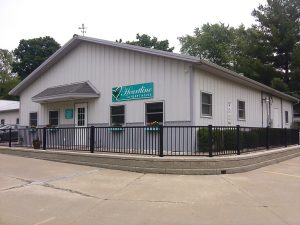Woodford Heartline and Heart House gives people lifeline, sense of home
By Holly Eitenmiller For Chronicle Media — February 21, 2020
It’s not uncommon for people to live from paycheck to paycheck, but it’s a balancing act that often places them in unexpected and overwhelming predicaments.
“Anybody can fall into this crisis and emergencies happen to every single one of us, and lots of us are one paycheck away from a crisis,” said Brandi Gerber, executive director for Heartline and Heart House. “Someone passed away and you have to travel, or your car breaks down and you have to use the rent money to pay for the car, there are all sorts of things that can go wrong.”
Heartline and Heart House is a faith-based, non-denominational organization that got its start in 1982 through local ministers and community leaders as an information and referral service. Heartline came first, and Heart House followed in 1992.
Heart House serves victims of domestic abuse and the homeless of Woodford County and the City of Washington. It initially operated from a vacant Eureka College fraternity house. Within three years, Heart House moved from its rented campus building to its own secure facility.
“It’s a locked facility with a camera, and we can take care of 21 people here, including children,” Gerber said. “The average stay is between two to three months, though, on occasion, we’ll have someone here for over a year. Everyone is so different and unique.”
When someone comes to the doorstep of the six-room facility, for homelessness or to escape domestic abuse, they’re assigned a case manager, who assess the immediate needs of the guest. Goals are set, and access is provided to support services and agency benefits, such as housing, food stamps, and Medicaid.
Next, three critical, individual needs of the guest are looked at; mental, emotional and spiritual growth. Once and individualized program is put in place, the case manager assists the person as they advance and grow to achieve self-reliance, self-worth and confidence and successfully leave the shelter and live independently.
Heart House works with the Center for Prevention of Abuse, church leaders, professional counselors and adult services professionals to gain access to assistance and services that can’t be accessed within the organization.

The family room at the Heartline and Heart House. The organization gives a safe place to those who might be leaving a violent domestic situation or who are financially struggling and need to get back on their feet to find a home. (Photo courtesy of WCHL)
“We work with them on writing their resumes and we have a program manager in the shelter who will work with them on setting goals and meeting those goals and getting them pointed in the right direction,” Gerber explained. “We have partnerships with other agencies that do support groups and have counseling sessions, also.”
It wasn’t long after Heartline began as a simple referral service, that it became clear there were some needs that couldn’t be met through traditional avenues. Temporary needs, it seemed, were most often unmet.
“It initially started to find help with utilities, and we were finding that people were falling in between the cracks in the system,” she said. “It became apparent that we needed to do more than information and referrals.”
Another example of such situations would be when a child is sick and home and the parent can’t work during that time. For such short-term crises, Heartline steps in with emergency rent, utility, medical and sundry other abatements.
“Heartline is for a temporary crisis. If they can show that, within a month or two, that they will be OK again,” Gerber said. “These things can happen with anybody, our neighbors, people we got to church with people right here in the community.”

To raise awareness of homelessness and poverty, Woodford County Heartline and Heart House invites folks each year for Night in A Car at Grace Church of the Nazarene. Participants must raise $1,000 per vehicle, and those who stay through the night are served a hot breakfast and given a gift of appreciation. This year, Night in a Car is slated for Nov. 13-14. (Photo courtesy of WCHL)
The organization operates completely from donated money, and doesn’t rely on any state or federal dollars. Hearthouse and the additional building space at 300 Reagan Drive were built on those funds, which much of it coming from annual events, including a spaghetti dinner and bake sale, the Race with Your Heart run and a December bell-ringing campaign.
In fall, they also host “Night in A Car”, a poverty simulation that raises awareness of homelessness. The nearest event will be the spaghetti dinner, which is slated for April 2 at the Heartline Community Room. The run follows in June.
“We live in a very wonderful, generous community that just amazes me all the time,” Gerber said. “Whenever we put a need out, that need is always met by genuinely caring people.”
For more information on Heartline and Heart House events, ways to donate, or means to get help, visit the organization’s website at www.heartlineandhearthouse.org or their Facebook page, “Heartline and Heart House”.








